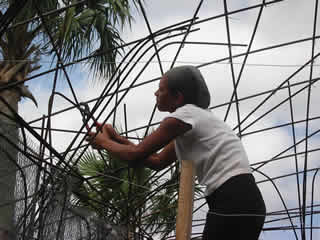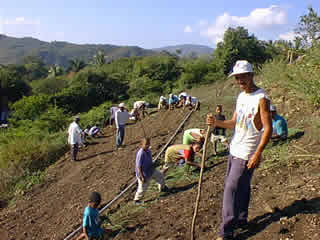La Historia de CAREL
Hace más de 15 años CAREL (inicialmente el Proyecto Eco-Partners de CRESP-Cornell) ha trabajado con los residentes rurales de la Republica Dominicana con el fin de crear modelos sociales sostenibles, cuales integraron la vida del campo tradicional con la tecnología de verdad apropiada, en particular sistemas micro-hidroeléctricos y de acceso inalámbrico del Internet. Inicialmente este apoyo era entregado en las comunidades particulares. Pero con el crecimiento de interes en la tecnología comunitaria participativa, salió la necesidad de una facilidad donde pueden llegar grupos para cursos y talleres.
El edificio principal era completado y inaugurado en el mes de Julio de 2013, con apoyo de la OEA y varias otras instituciones y personas. El Centro Rural ya funcione como una universidad abierta, operando por y para residentes rurales.
El Centro todavía falte un dormitorio y comedor, cuales son los próximos pasos de construcción.
La primera serie de talleres, septiembre 2013 - enero 2014, eran entregados con la colaboración con la Red Dominicana para el Desarrollo Sostenible de las Energías Renovables (REDSER). Se enfocaban en la preparación de técnicos micro-hidroeléctricos comunitarios. Se entregaban 10 talleres técnicos con el fin de preparar dos técnicos de cada comunidad participante, más un taller específicamente para mujeres.
What it's all about
All over the world, rural villagers are reaching for the quality of life we take for granted. But after achieving the vital but bare essentials… a rough dirt road, a simple elementary school, and a plastic pipe that delivers unfiltered water… progress stalls. The next steps… electricity, secondary education, accessible health care, and an economic structure that supports more than bare survival… have remained hopelessly out of reach for many millions of people.
For the last few years, change has been in the wind. The communications tools that are sweeping the developed and urban sectors of the world... particularly the Internet... are broadly seen as offering a realistic, cost-effective way of breaking through age-old isolation and enabling rural communities to move ahead with their own development.
Other technologies are also key to development, notably renewable, ecologically benign sun-based energy alternatives to petroleum.
But these advances have been disappointingly slow to arrive in the countryside. Practical, successful, replicable models like El Limon are needed to close the gap between vision and reality. CAREL performs a critical bridging function, bringing high-level expertise in adapting technology for rural needs, while being based in, and organizationally responsible to, a small farming village.
El Limon is exploring a new model for development, rooted in high-quality communications between people, and humanistic and ecological values, rather than in interventions by governments and large institutions. This website provides information about CAREL's role and the multiplier technologies involved, and invites you, the visitor, to participate in the process.
 |
Sobre el Centro Rural en El Limon |
 |
Sobre la Comunidad de El Limon |
Some Details About CAREL CAREL (Centro Alternativo Rural El Limon) is a not-for-profit organization incorporated in the Dominican Republic by Decree 1548 of December 3, 2004, under Law 520. Its mission is to Assist rural residents to raise their quality of life in an ecological and humane manner Specific Objectives are: a) Work to develop, implement and promote innovative actions in the areas which include, but are not limited to, renewable energy, computers, and telecommunications, sustainable agriculture, and local culture. b) Work at the level of the community of El Limon, as well as the regional, national, and world levels. c) Implement a center for research and capacity building in El Limon of Ocoa d).Conduct scientific and technical research in El Limon and other locations e) Implement educational and capacity building activities both formal and informal f) Implement cultural activities that could preserve and increase the cultural level of the rural population g) Establish services that will benefit rural residents, receiving a minimal amount of repayment: services of telecommunications, education, consulting, technical assistance, distribution of seeds and plants, and others. h) Conduct other activities and programs on the greatest diversity of themes possible, always and whenever these contribute to the greater development of rural communities. |
